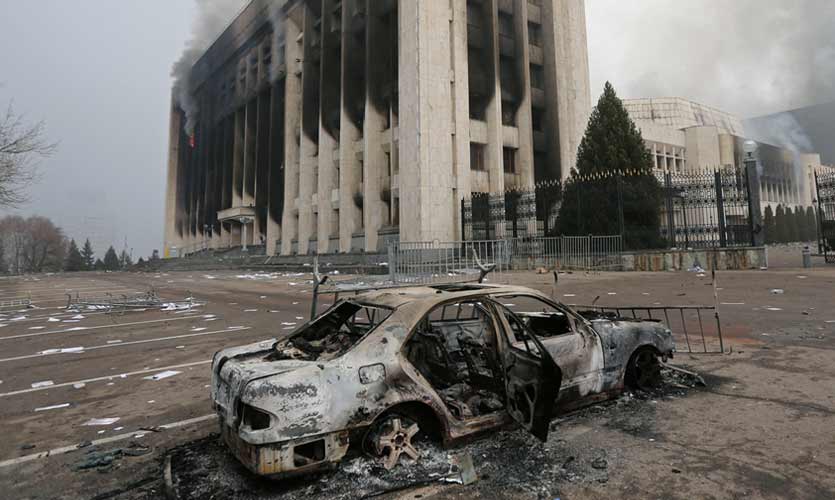A death toll of over 160 people has been reported in several days of unrest in Kazakhstan, with almost 6,000 arrests following the riots in Central Asia’s largest country. In a week of upheaval, the 19-million-strong nation has been plagued by unrest with several foreigners being detained. On Sunday, the government-run information portal reported that 164 people died in the riots, including 103 in the largest city Almaty, the scene of some of the most violent confrontations between protesters and security forces. It was previously reported that 26 “armed criminals” had been killed and 16 security officers had perished.
It has been reported that the health ministry told Russian and Kazakh media that the information had been published in error, but no official statement denying it has been made, nor has a new figure been released. A total of 7939 people have been detained, including “a considerable number of foreign nationals”, the presidency announced in a statement following a crisis meeting led by President Kassym-Jomart Tokayev. It said that the situation in all regions had stabilised although a clean-up operation was still ongoing.
The unrest that began in Kazakhstan last week was sparked by a hike in fuel prices, spreading rapidly to many major cities, including Almaty, where riots broke out and police opened fire with live rounds. On Sunday, local media reported that 175 million euros ($199 million) were estimated as property damage by the interior ministry. Approximately 100 businesses and banks were attacked and looted, and over 400 vehicles were destroyed, according to the ministry. An AFP correspondent reports that a relative calm has returned to Almaty, with police occasionally firing in the air to deter people from approaching the city’s central square. The media reported that supermarkets have reopened amid fears of food shortages. Kazakhstan announced on Saturday that its former security chief was being held for suspected treason.
The detention of Kazakh former Prime Minister Karim Masimov, a close supporter of former president Nursultan Nazarbayev in the ex-Soviet country, took place amid suspicions of a power struggle. Masimov was arrested on Thursday by the domestic intelligence agency, the National Security Committee (KNB), on accusations of high treason. As the protests became more violent, government buildings in Almaty were assaulted and set on fire. Aidos Ukibay, Nazarbayev’s spokesperson, disputed on Sunday that the ex-president had left the country and claimed he backed the president. Ukibay noted that Nazarbayev had deliberately relinquished authority of the security council. President Tokayev declared on Friday that 20,000 “armed bandits” had assaulted Almaty and that he had authorised his men to fire to kill without notice.
Most of the popular outrage in Kazakhstan appeared to be focused on Nazarbayev, who had controlled the country since 1989 until relinquishing office in 2019. Many demonstrators chanted “old man out!” in reference to Nazarbayev, and a monument of him was demolished in Taldykorgan, a southern city. Critics accuse him and his family of remaining in power behind the scenes and amassing large fortunes at the cost of regular residents. The actual scope of the mayhem has sometimes been obscured, with massive communications problems and planes into the nation regularly cancelled. Officials stated on Sunday that the airport in Almaty will stay closed “until the situation stabilises”.
On Sunday, US Secretary of State Antony Blinken criticised the shoot-to-kill order and asked for its repeal. “That is something that I absolutely reject. The shoot-to-kill order, to the extent it exists, is wrong and should be rescinded,” US President Joe Biden’s senior diplomat told ABC’s Sunday chat show “This Week”.
In his Angelus prayer on Sunday, Pope Francis expressed his “sorrow” and urged for dialogue to establish peace. President Tokayev has expressed gratitude to the Moscow-led Collective Security Treaty Organization (CSTO) for sending soldiers to assist in dealing with the disturbance. Tokayev claims the deployment is just temporary, but Blinken warned on Friday that Kazakhstan may have difficulty removing them. “I think one lesson in recent history is that once Russians are in your house, it’s sometimes very difficult to get them to leave,” Blinken told reporters.
Read more: Australia, Japan Sign Agreement To Offset Security Pressure From Beijing
Russia refused to give any concessions at the Geneva talks, held after a working dinner on Sunday evening. Tensions between Moscow and the West are at a post-cold war high over fears of a Russian invasion of Ukraine. “We will not agree to any concession. That is completely excluded,” Russian Deputy Foreign Minister Sergei Ryabkov said on Sunday.
According to Russian President Vladimir Putin, a military detachment deployed to Kazakhstan to curb unrest will remain there for only a “limited” time.
“A contingent of CSTO peacekeeping forces has been sent to Kazakhstan – and I want to emphasize this – for a limited time period,” Putin said during a meeting of leaders from ex-Soviet countries, during which he added that Kazakhstan had been targeted by “international terrorism”, and vowed that Russia would not allow “revolutions” in the region.










